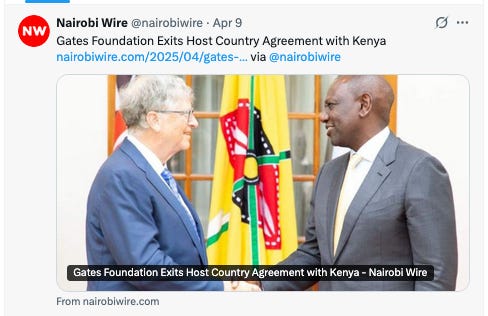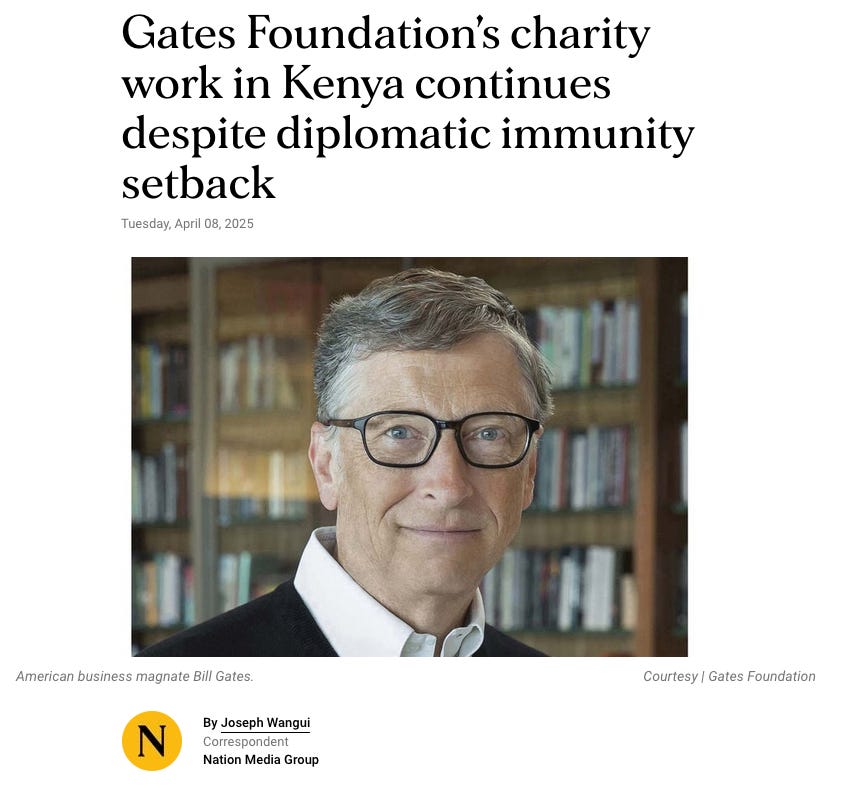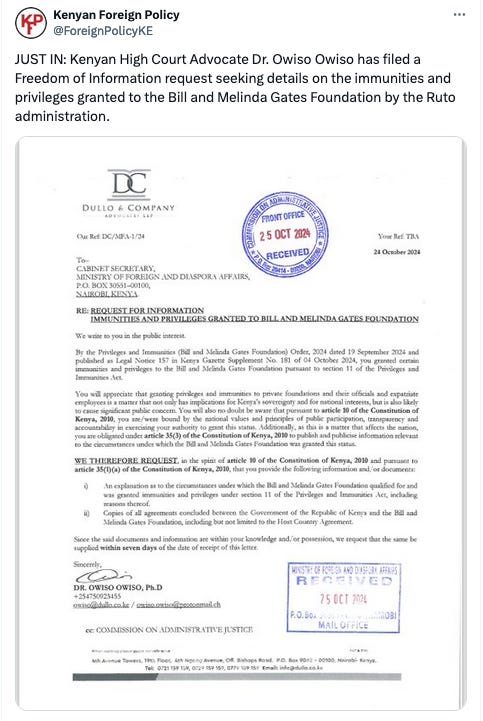Gates Foundation loses diplomatic immunity in Kenya
In a major victory for democracy, Bill Gates's oligarchic assertion of power is overturned

Late last year, the Gates Foundation reached a new level of influence and power on the global stage, securing official diplomatic immunity in Kenya. The government, it appeared, had granted Bill Gates, his staff at the foundation, and his contractors immunity from legal proscecution—troubling because of the many high-profile allegations the Gates Foundation and Bill Gates face around workplace misconduct, undemocratic political meddling, and highly questionable charitable projects.
The Gates Foundation’s claimed diplomatic immunity, however, was short lived—because of the public outrage that followed, alongside a formal legal challenge. As I reported last December, the Kenyan judiciary first issued a temporary suspension of Gates’s diplomatic immunity. This week, as legal proceedings advanced, the Gates Foundation formally retreated, saying the controversy surrounding its diplomatic immunity had become too big of a distraction.
It’s a major reversal—and huge victory—that has far-reaching consequences. Many observers worried that if Gates’s diplomatic immunity went unchallenged in Kenya, other African nations would feel compelled to follow Kenya’s lead—offering legal immunity in order to secure funding from the billionaire philanthropist.
The Gates Foundation—-and Gates-funded media outlets—-have tried to put a happy face on the decision, describing Gates’s loss of immunity as a minor setback. But there should be no confusion about what really happened. Bill Gates pushed the limits of his oligarchic power, seeking to put himself and his philanthropy above the law. And the checks and balances of democracy denied him.
The headline of the Nation Media Group, above, seems to conform closely to the spin that the Gates Foundation has deployed (below). Nation Media Group, based in Kenya, has taken at least $7.7 million in funding from the Gates Foundation. Buying influence over the news media, something the Gates Foundation does around the world, is one more way the foundation seeks to avoid checks and balances and to suppress democratic debate about its work.1
When I first reported on Gates’s claimed diplomatic immunity last October, I talked to Daniel Maingi, an agricultural expert and coordinator for the Kenya Food Rights Alliance. Maingi cited concerns about the Gates Foundation’s history of questionable chatitable crusades, treating the global poor as human guinea pigs.
The foundation’s social experimentation has often proven highly ineffective and enormously harmful—including in Kenya, the homebase of the Gates Foundation’s embattled work in agricultural development. The “green revolution” that Gates promised to create in African agriculture—working through a Gates-led organization in Nairobi called AGRA—-has translated into so much destruction and polarization that farmer groups across the African continent are now asking the foundation to pay reparations.
When I followed up with Maingi this week, he offered me a long, thoughtful response, which I’m reprinting in its entirety below. I find it moving and powerful—and inspiring:
The Withdrawal of Gates Foundation's Immunity in Kenya: A Turning Point for Sovereignty and Accountability
Bill Gates' withdrawal of the demand for diplomatic immunity in Kenya feels like a long-overdue release from the barnacles of a giant octopus—an octopus that had wrapped its slick, silent tentacles around critical areas of our public policy, our food systems, our health, and even our education. This immunity, had it gone unchallenged, would have given the Gates Foundation and its web of agencies unchecked, carte blanche access to every sphere of life in Africa—without scrutiny, without accountability, and without consequence.
Let us be clear: the issue was never about philanthropy. It was about power without responsibility. It was about a billionaire-funded entity leveraging its wealth to bypass regulatory oversight, to bulldoze through Kenya’s legislative and public interest safeguards, and to reengineer systems that affect millions of lives—while being shielded from legal and civic scrutiny.
This retreat from the Host Country Agreement is not just a legal footnote; it is a statement. It is a reminder that Kenya, and indeed Africa, is not a playground for experiments hatched in corporate boardrooms or Western think tanks. It is a land of sovereign people with the right to question, to regulate, and to say no—especially when our seeds, our soils, our health, and our children's futures are on the line.
The removal of immunity should not be seen as the end of vigilance. On the contrary—it should embolden us to demand even greater transparency from the Gates Foundation and all others who wish to operate within our borders. No more diplomatic bulldozing. No more hiding behind "philanthropic good" to push genetically modified seeds, questionable vaccines, or tech-driven agricultural models that serve foreign interests more than they serve our smallholder farmers.
Kenya has spoken, and the message is clear: aid without accountability is no aid at all. This is not anti-science or anti-progress. It is pro-justice. Pro-democracy. Pro-African agency.
Let this moment be a clarion call for the rest of the continent—we are not passive recipients of foreign largesse. We are active architects of our future.
Gates’s defeat in Kenya is a very good thing, one that we should celebrate. In a world that appears increasingly over-run by oligarchs, we need to take every win we can get.
But we also can’t take our collective foot off the pedal. Now that the Gates Foundation is in retreat, it is time to more fully confront its destructive, colonial power. We need a full accounting of how Bill Gates ever was positioned to put his billionaire philanthropy above the law—so that we can make sure no other billionaire ever tries this again in Kenya, or any other democratic nation.
It sounds like this process is already underway; I, for one, am very eager to see what documents turn up in his freedom-of-information request:
Democracy is a process, not a privilege, and it can’t be successful unless people are willing to put their time and energy into making it work—into challenging those who use their wealth and power to subvert it, to make their voices heard above all others.
As Daniel Maingi writes, it’s time we recognize our power to be active architects of our future.
My press inquires to the foundation last October, asking to discuss its diplomatic immunity and its funding of journalism, generated no response. I sent a follow up this week. If I get any meaningful engagement, I will share it with readers.







Love this! "aid without accountability is no aid at all. This is not anti-science or anti-progress. It is pro-justice. Pro-democracy. Pro-African agency."